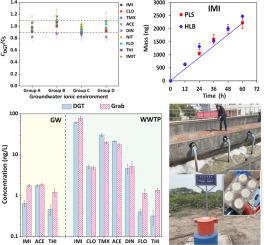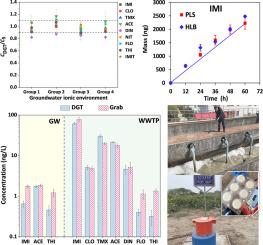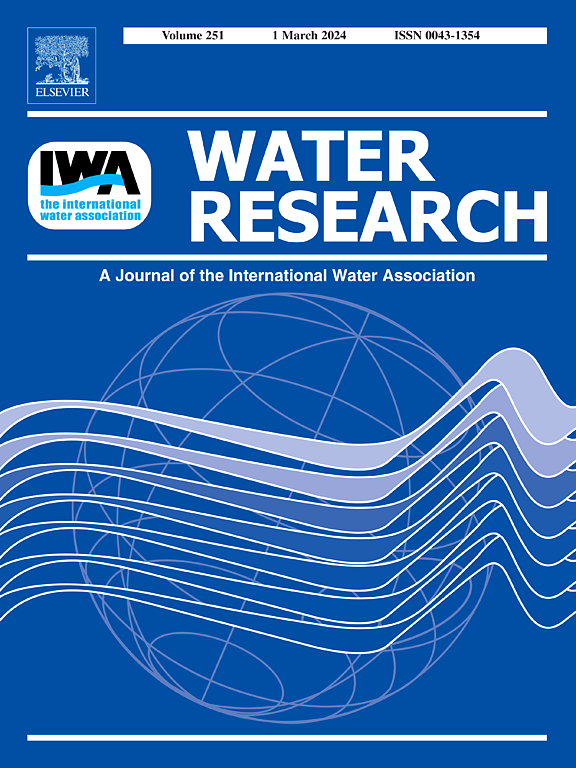Diffusive gradients in thin-films (DGT) for in situ measurement of neonicotinoid insecticides (NNIs) in waters
IF 11.4
1区 环境科学与生态学
Q1 ENGINEERING, ENVIRONMENTAL
引用次数: 0
Abstract
Neonicotinoid insecticides (NNIs) are among the most widely-used insecticides, although their threat to non-target organisms has attracted attention in recent years. In this study, a diffusive gradient in thin-films (DGT) passive sampling technique was developed for in situ monitoring of time-weighted average (TWA) concentrations of NNIs in groundwater and wastewater. Systematic studies demonstrated that DGT with HLB as binding gels (HLB-DGT) is suitable for quantitative sampling of NNIs under a wide range of conditions, independent of pH (5–9.5), ionic strength (0.001–0.5 M) and dissolved organic matter (0–10 mg/L). The HLB-DGT performance was also independent of the typical groundwater ionic environments. The thicknesses of in-situ measured diffusive boundary layer were 0.35 and 0.25 mm in the groundwater and effluent, respectively. HLB-DGT can provide TWA concentrations over 14–18 days’ deployment with linear uptake in both groundwater and wastewater. Concentrations and occurrence patterns of NNIs obtained by HLB-DGT were consistent with those measured from grab samples. The median TWA concentration of NNIs was 4.42 ng/L in water from the largest urban lake of China (the Tangxun Lake) in winter, with wastewater discharge being the main potential source. The reliability and stability of the HLB-DGT for measuring NNIs in the groundwater and surface water were confirmed and can be used to improve understanding of the occurrence and fate of NNIs in aquatic environment.


用于原位测量水体中新烟碱类杀虫剂 (NNIs) 的薄膜扩散梯度 (DGT) 技术
新烟碱类杀虫剂(NNIs)是使用最广泛的杀虫剂之一,但近年来其对非目标生物的威胁引起了人们的关注。本研究开发了一种薄膜扩散梯度(DGT)被动采样技术,用于原位监测地下水和废水中 NNIs 的时间加权平均(TWA)浓度。系统研究表明,以 HLB 作为结合凝胶的 DGT(HLB-DGT)适用于在广泛条件下对 NNIs 进行定量采样,不受 pH 值(5-9.5)、离子强度(0.001-0.5 M)和溶解有机物(0-10 mg/L)的影响。HLB-DGT 的性能也不受典型地下水离子环境的影响。原位测量的扩散边界层厚度在地下水和污水中分别为 0.35 毫米和 0.25 毫米。HLB-DGT 可以在地下水和废水中提供 14-18 天的 TWA 浓度,并具有线性吸收能力。HLB-DGT 获得的 NNIs 浓度和出现模式与从抓取样本中测得的结果一致。在中国最大的城市湖泊(汤逊湖)冬季水体中,NNIs 的 TWA 浓度中值为 4.42 ng/L,废水排放是主要的潜在来源。证实了 HLB-DGT 测量地下水和地表水中 NNIs 的可靠性和稳定性,可用于提高对 NNIs 在水生环境中的发生和归宿的认识。
本文章由计算机程序翻译,如有差异,请以英文原文为准。
求助全文
约1分钟内获得全文
求助全文
来源期刊

Water Research
环境科学-工程:环境
CiteScore
20.80
自引率
9.40%
发文量
1307
审稿时长
38 days
期刊介绍:
Water Research, along with its open access companion journal Water Research X, serves as a platform for publishing original research papers covering various aspects of the science and technology related to the anthropogenic water cycle, water quality, and its management worldwide. The audience targeted by the journal comprises biologists, chemical engineers, chemists, civil engineers, environmental engineers, limnologists, and microbiologists. The scope of the journal include:
•Treatment processes for water and wastewaters (municipal, agricultural, industrial, and on-site treatment), including resource recovery and residuals management;
•Urban hydrology including sewer systems, stormwater management, and green infrastructure;
•Drinking water treatment and distribution;
•Potable and non-potable water reuse;
•Sanitation, public health, and risk assessment;
•Anaerobic digestion, solid and hazardous waste management, including source characterization and the effects and control of leachates and gaseous emissions;
•Contaminants (chemical, microbial, anthropogenic particles such as nanoparticles or microplastics) and related water quality sensing, monitoring, fate, and assessment;
•Anthropogenic impacts on inland, tidal, coastal and urban waters, focusing on surface and ground waters, and point and non-point sources of pollution;
•Environmental restoration, linked to surface water, groundwater and groundwater remediation;
•Analysis of the interfaces between sediments and water, and between water and atmosphere, focusing specifically on anthropogenic impacts;
•Mathematical modelling, systems analysis, machine learning, and beneficial use of big data related to the anthropogenic water cycle;
•Socio-economic, policy, and regulations studies.
 求助内容:
求助内容: 应助结果提醒方式:
应助结果提醒方式:


